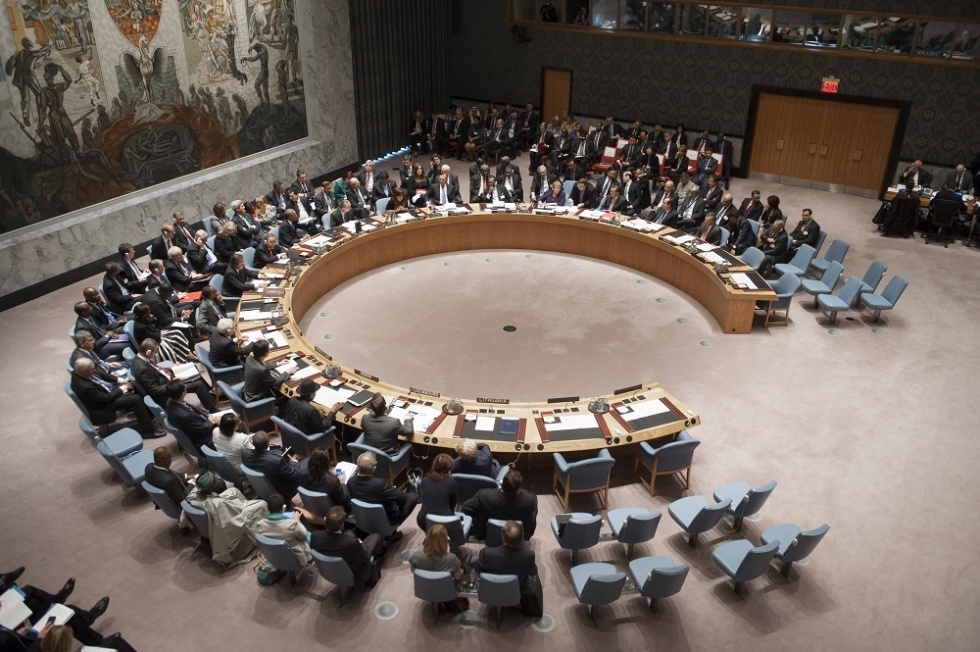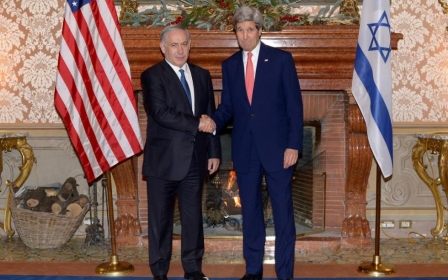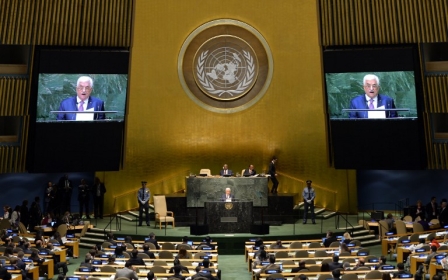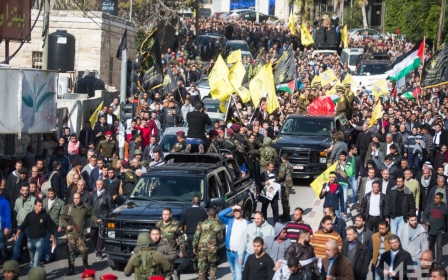Tough day of talks as Palestinians push for UN statehood bid

LONDON - The pre-Christmas push for a UN Security Council resolution seeking to end the Israeli occupation of Palestine intensified on Tuesday, with high-level diplomatic talks taking place throughout the day.
US Secretary of State, John Kerry first met with Chief Palestinian Negotiator, Saeb Erekat in London, and then held separate talks with Secretary General of the Arab League, Nabil al-Arabi. French Foreign Minister, Laurent Fabius also meet with Arabi.
“We remain extremely engaged in the Israeli and Palestinian conflict and indeed all the conflicts that have dominated conversations during the last week,” Kerry said in a statement following the meet.
He failed to discuss the prospect of two separate draft UN resolutions on Palestinian statehood currently being discussed behind the scenes, but Kerry did admit that he understood the “frustrations” about the stalled peace process.
“In the end this is not up to the international community or others. It has to be decided by the parties and the parties have to want this more than anyone on the outside,” Kerry said.
“Right now what we are trying to do is have a constructive conversations with everyone – to create the climate, the atmosphere, the political space … so that we can go back to negotiations and resolve all of this.”
The meetings come a day after Kerry met with Israeli Prime Minister Benjamin Netanyahu in Rome.
“I very much appreciate the Secretary of State's efforts to prevent a deterioration in the region,” Netanyahu said after the meeting at the US Embassy.
“I said that the attempts of the Palestinians and of several European countries to force conditions on Israel will only lead to a deterioration in the regional situation.”
Tensions are running especially high after the Palestinians announced that they would be pushing through an Arab-backed, two-year time table for ending the Israeli occupation, as early as Wednesday.
“I am the Palestinian Authority without any authority,” Palestine’s top peace negotiator Saeb Erekat told MEE days before the European diplomatic drive.
“I am making Israel a cost-free occupation and that is why I am telling the Americans: business as usual no more. Stop. No more.”
However, the Jordanian authorities - who currently represent the Arab League at the Security Council - said that they had no immediate plans to push through the UN vote.
Jordan had originally circulated the Palestinian text, setting a deadline of November 2016 for a full Israeli withdrawal.
The French have countered this draft, and are trying to present their own version which would adhere to the two-year timetable, but fall short of calling for a withdrawal of Israeli troops.
While Washington - a long-time Israel ally and veto wielding member of the UN Security Council - is widely expected to shoot down the Jordanian-backed UN resolution, Paris hopes that it can persuade both Kerry and the Palestinians to agree on their draft.
French Foreign Minister Laurent Fabius told AFP on Monday that they were looking for "a resolution which everyone can get behind".
"Even if the Palestinians have a text in their hand, the Americans have already said that they will veto it," he said.
US officials accompanying Kerry also told media that Washington remained undecided about the Paris-backed draft, but heavily suggested that they would not consider supporting the Arab-backed resolution.
"There are certain things we would never support," said a State Department official, without elaborating.
Daniel Levy, director of the Middle East and North Africa Programme at the European Council of Foreign Relations said:
“It ultimately depends on whether the Americans are going to let something pass that Israel digs its heels in on - and the track record on that is not encouraging.
“I don’t think that there is a resolution that will be acceptable to both sides because the Israeli position is sufficiently hard-line and sufficiently deviates from even previous positions that Israel may have even taken, let alone international positions. In that respect there is no middle ground. “
To pass, the resolution would need at least nine votes out of the Security Council’s 15 members. It would also require all of the council’s five permanent members – Russia, America, France, Britain and China - to either abstain or vote yes.
“It is too soon to tell. I don’t think that the PLO want to go to the UN unless they are sure of nine votes otherwise it is a defeat for them,” said Nadia Hijab, executive director of Al-Shabaka: The Palestinian Policy Network, a think tank promoting human rights and public debate on the Israel-Palestine issue.
“The aim is to force the US to veto if they can’t get a consensus… But they are primarily trying to buy time and doing anything they can to postpone the dreaded moment when they say they have run out of options.
“They’re doing this now, because they have to be seen to be doing something - especially after the death of a Palestinian minister. They have lost enormous credibility with the Palestinian people so that shows they are still in the game.”
Both the Palestinian and the American leadership will now have to dig deep to try regain the upper hand, Sam Bahour, an American-Palestinian businessman and commentator said.
He told MEE: "The United States is once again forcefully bending the Palestinian leadership’s arm behind its back. This time around, the US’s bullying efforts aim to stop Palestinians from submitting a draft UN resolution to the UN Security Council later this week, a resolution that would set an end date for the nearly 50 year Israeli military occupation."
"The tragicomedy of US monopolisation of the never-ending ‘peace’ process has come to a dead end. The US now stands at a crossroads in its mediation of the talks. The Obama administration can no longer talk the talk of two states, while at the same time refusing to take even a baby step forward in trying to bring a two state solution about."
"Palestinians are finally calling the historic US two state bluff."
Recognition momentum
Recent months have seen a string of European parliaments either recognise Palestine as a state in non-binding agreements, or make moves to step up recognition.
France, UK, Ireland, Spain and Sweden are among those to have made the headlines, working to ignite fierce Israeli condemnation.
Netanyahu called the French parliamentary vote earlier this month a “grave mistake” and said that it would “harm the peace process”.
The issue is incredibly sensitive in Israel, with an Israeli cabinet minister on Tuesday warning against the establishment of a Palestinian state on the entire Israeli-occupied West Bank, describing the move as "the equivalent of asking it [Israel] to commit suicide".
"Instead of peace, we will get Hamas or the [Islamic State] in the suburbs of Tel Aviv and Jerusalem," Strategic Affairs Minister, Yuval Steinitz was quoted as saying by The Jerusalem Post.
However, ire over this summer’s war in Gaza where more than 2,100 Palestinians, mostly civilians, were killed, seems to have created definite momentum toward some kind of recognition, or at the very least reignited interest in pushing for fresh peace talks. The last round of talks collapsed in April, after Israel reneged on an anticipated prisoner swap deal.
“Since 1948, we have never been supported by the international community as we are now,” Erekat said in his exclusive interview with MEE. “And those who don’t want to see this, it seems to me that either they are point scorers, finger pointers, or people who don’t want to see a Palestinian state.”
Regional security concerns and the US-led coalition against Islamic State militants in Iraq and Syria are also underpinning a possible shift in western policy and could prompt Kerry to go further than many would have expected only a few months ago.
“The US is leading a coalition of Arabs and Muslims and bombing two Arab and Muslim countries,” Erekat said. “What would the Arabs and Muslims say to a veto from the US saying no to a Palestinian state [based] on 1967 borders? It would be too much. Too much because Israel and Israel’s behaviour is becoming a burden in Europe, the United States, and all civilised nations.
“The continuation of such activities – settlement [growth], the rejection of the two-state solution [and] killing Palestinians in cold blood,” he added.
Middle East Eye propose une couverture et une analyse indépendantes et incomparables du Moyen-Orient, de l’Afrique du Nord et d’autres régions du monde. Pour en savoir plus sur la reprise de ce contenu et les frais qui s’appliquent, veuillez remplir ce formulaire [en anglais]. Pour en savoir plus sur MEE, cliquez ici [en anglais].




